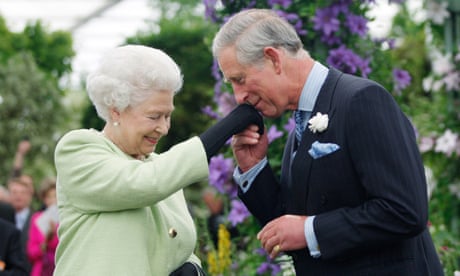- by foxnews
- 03 Apr 2025
King Charles: oldest new monarch ever. How will he handle his reign?
King Charles: oldest new monarch ever. How will he handle his reign?
- by theguardian
- 11 Sep 2022
- in news

King Charles III has been waiting his whole life for this moment. At his birth 73 years ago he became second in line to the throne and for the past six decades, ever since his mother ascended the throne in 1952 when he was three, he has been the heir apparent.
He was brought up, trained and endlessly coached for a job that has finally come to him at an age when most men want nothing more than a peaceful retirement; a time which, in his case, might have otherwise involved growing organic vegetables and painting watercolour landscapes.
So can Charles accomplish something similar? Can an older sovereign, succeeding an elderly one, engage the monarchy with a country whose population is mostly much younger than he is and whose future is with a coming generation, not a departing one? Particularly one whose politicians, business leaders, generals, police chiefs are decades his junior: 20, or 30 years younger, a whole generation with different experiences and skills.
This would be a terrible legacy after all this time of waiting: a great humiliation for a deeply proud and self-conscious man who has had dinned into him all his life the special responsibilities he will one day bear.
Unlike his predecessors, especially Edward VII, he has been trained in the requirements and expectations of monarchy: he has seen the state papers, sat in on the meetings, and stood in for his mother at royal events. He is as prepared as anyone could be for the role of head of state, and has been for more than half a century. He is the oldest as well as the longest-waiting heir to the throne and Prince of Wales. Now his hour has come.
First, there was the sensitive little boy with the ruthless father and the often absent mother, sent to board at the spartan and hated Gordonstoun school in Scotland.
Then came the awkward undergraduate life at Cambridge, the brief naval career, and the prolonged search for an eligible wife, the disastrous marriage to the fairytale princess, then the tragic denouement of their acrimonious divorce followed by her sudden death a year later.
We have seen more of him, heard from him more often and giggled at his eccentricities and sheer oddness more regularly for decades than was possible with any of his predecessors. But since Charles is a more complicated, difficult and reserved man than modern celebrity allows, his popularity is decidedly limited: he is not loved or even liked much, nor particularly admired or respected, and this is a very great handicap to overcome in his new role.
For, after all these years, Charles Philip Arthur George, Prince of Wales, brings with him considerable baggage. We know where he stands on issues such as organic farming, education, modern architecture, town planning, the countryside and herbal medicine; these are all issues that are not party political, but deeply and controversially partisan and certainly political with a small p.
It is not that he has these opinions so firmly and publicly, nor even that they are particularly quaint, though some of them are, but that they are expressed so dogmatically. They amount to a belief-set which has for many years defined the man: conservative, slightly tweedy, a little snobbish, hankering for a romantic never-quite-was past, looking for somewhat reactionary, small-scale, individualistic solutions to the giant problems of the modern age. We all get a bit stuffier as we get older, but a preference for the Goons 60 years after their humour was novel and innovative is possibly taking things a little far.
Some of this may be admirable, but it may be hard to reconcile with a job demanding absolute discretion as the price of survival. No one ever knew what his mother thought about anything: the trouble is that everyone knows what Charles thinks about practically everything.
Throughout his life he has listened almost entirely only to people who agree with him: argument, or debate, does not come easily, particularly for one who stands so firmly on his dignity.
The Duchy Originals biscuits and knickknacks may be doing their bit for farms on his vast estates, but they are overpriced and heavily subsidised from the profitable bits of the Duchy of Cornwall, which give him an annual income touching £20m, largely drawn from the rentals of urban shopping centres and agreeable chunks of central London. Poundbury, his model village in Dorset, bears all the hallmarks of a vanity project, subjecting ordinary folk to the sort of experiment in cramped social living that he would not dream of for himself.
And hiding is difficult for a modern monarch. Kings and queens have been under the scrutiny of the media for several centuries now and Charles has lived his whole life in its spotlight, from his first baby photographs and outings in the pram to the mundane round of visits and duties.
Charles begins as king with a large legacy of public goodwill, bequeathed him by his mother, as well as institutional inertia, which he will have to be careful not to squander. He may feel that it is, at long last, his turn, after all these years. But will he be an old man in a hurry? How otherwise will he make his mark on history? And what if that mark is to bring the whole house tumbling down?
- by foxnews
- descember 09, 2016
Flight passenger says man deliberately squatted in window seat, ignites social media debate
An airline flyer said a seat squatter tried to tell her to swap seats with him, but she stood her ground, prompting a social media debate. A travel expert weighs in.
read more


